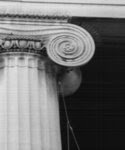Marc Englemann's appeal of the denial of his motion for a new trial was granted, and the matter was sent back to the District Court for further consideration. Several months ago, the Court had a hearing on whether the sequestration order was violated when the FBI case agent was seen talking to his partner and maybe the lead prosecutor or maybe someone else in the hallway of the courthouse, and found it was not. Engelmann appealed this decision. The Court of Appeals decided that there should be an evidentiary hearing so the Judge could hear from the various witnesses. After this evidentiary hearing, the motion was again denied.
Three individuals claimed they witnessed the above-referenced conversation, though their recollections were rather varied. First up, was Richard McNamara, a self-employed contractor. Mr. McNamara called the judge's chambers, on 14 September 2011, the day after Engelmann's verdict was returned. When asked by the chambers staff person what his relationship was to the case, he replied that his wife and Engelmann's ex-wife were friends. He forgot to mention that he had known Engelmann for many years, and used Engelmann for several hundred legal matters, including real estate transactions and incorporations, and that Engelmann was the registered agent for several of Mr. McNamara's corporations and LLCs.
According to Mr. McNamara, during a recess on the afternoon 09 September 2011, which was the last day of testimony, he was walking down some steps, and heard an unidentified person saying something to the effect of, "we had Engelmann at his office." The court noted that the specific language was somewhat in doubt. He looked back to see the FBI case agent and his partner, and an individual he did not recognize. He pointed this out to his daughter, Kathryn Sommers. He recalled that the conversation was "serious," but could not hear them. Even though he apparently thought this discussion was significant and important enough to call a federal judge to discuss it, he waited until after the trial was over to bring it up to anyone, including, apparently, Engelmann or his attorney. The court also noted Mr. McNamara's personal interest in the case in a footnote where he described the FBI case agent recalling that Mr. McNamara gave him a "thumbs down" gesture as they were leaving the courthouse after the case agent's testimony. I think that most people, as a general rule, try to avoid rude gestures to FBI agents, especially at federal courthouses.
Ms. Sommers recalls this conversation taking place on the first day of the trial, 05 September 2011. She remembers her father drawing her attention to three men talking. She claims this group included the FBI case agent, his partner, and the lead prosecutor. She did not hear anything that was said by the group. Both Mr. McNamara and Ms. Sommers attended the most if not all of the trial, so the lead prosecutor would be easy to identify, even though Mr. McNamara did not recognize the third person in his group.
Finally, Jay Sommers, Ms. Sommers' husband, Mr. McNamara's son in law, at the time a Scott County assistant prosecutor, a character witness for Engelmann, and currently the attorney who took over Engelmann's practice, had a different recollection. He recalled standing in the lobby within five feet of Mr. McNamara and his wife. His wife called his attention to two people in suits talking about twenty-five to thirty feet away. She asked if they could do that. He later determined that the two individuals were the FBI case agent and his partner. Mr. Sommers was unable even to hear their voices.
Mr. McNamara was present during the closing arguments of Engelmann's trial, in which the prosecution stressed the importance of the FBI agents' testimony. It would seem that if he felt this hallway conversation was inappropriate, he would have brought it up to Engelmann or his attorney at that point. It was also discussed during the evidentiary hearing that Englemann's attorney had a copy of the report prepared by the FBI agents at the time of their interview with Engelmann before he was arrested, and that both agents testified consistently with that report. Based on this evidence, the Court did not find any prejudice to Engelmann which would require a new trial. According to the Court:
"More fundamentally, absent speculation and argument by interested parties, the only reasonable construction of the events during the afternoon recess on that Friday is a meeting of the prosecutors and their trial team with an upcoming rebuttal witness in which the prosecutor advised that witness of the areas that would be covered. This does not violate the Sequestration Order."
The motion for a new trial and the motion for release pending appeal were both denied.
Thursday, March 21, 2013
Subscribe to:
Post Comments (Atom)


No comments:
Post a Comment